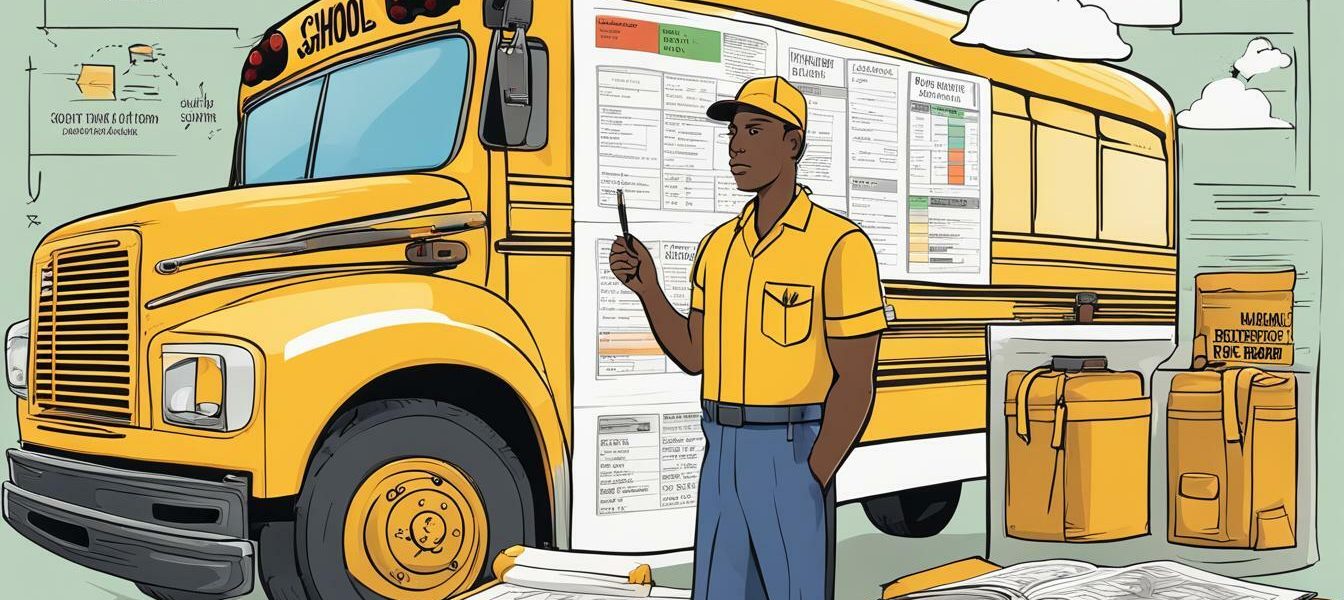
How Much Do School Bus Drivers Make
Have you ever wondered how much school bus drivers make? It’s a common question, especially for those considering a career in the transportation industry. The answer depends on various factors, including experience, location, and additional responsibilities.
In this article, we’ll explore the average pay, salary, wages, income, earnings, paycheck, compensation, and remuneration of school bus drivers in the United States. We’ll also discuss the factors that can influence a school bus driver’s salary, the highest and lowest paying states, additional benefits and perks, opportunities for advancement, job outlook, and more.
Key Takeaways
- School bus driver salaries vary based on location, experience, and additional responsibilities
- The average salary of a school bus driver in the US is influenced by factors such as state, region, and local economy
- Some states offer higher salaries for school bus drivers due to demand, cost of living, or other factors
- Additional benefits and perks, such as health insurance and retirement plans, may be included in a school bus driver’s compensation package
- Advancement opportunities can lead to higher earnings through promotions or specialized roles
- Job outlook for school bus drivers is influenced by factors such as demand, growth opportunities, and potential challenges
Factors Affecting School Bus Driver Salaries
While school bus drivers play a crucial role in ensuring the safety of school children, their salaries can vary depending on several factors. Understanding these factors can help drivers plan their career growth and earning potential. Here are some key factors that can impact school bus driver salaries:
| Factor | Description |
|---|---|
| Experience | The more experience a driver has, the higher their salary can be. Drivers with several years of experience can earn more than new drivers. |
| Location | The region, state, and city where a driver works can affect their salary. For example, drivers in urban areas may earn more than those in rural areas. |
| Additional responsibilities | Some school bus drivers may take on additional responsibilities, such as being a trainer or a driver supervisor. These extra duties can lead to higher salaries. |
It’s important to note that these factors can interact with one another. For example, a driver with more experience may also be working in a more urban area with higher demand, which can further increase their salary.
Average Salary of School Bus Drivers in the United States
According to the Bureau of Labor Statistics, the average annual salary for school bus drivers in the United States is $32,420. However, this figure may vary depending on several factors such as location, experience, and the type of employer.
| State | Average Annual Salary |
|---|---|
| California | $42,410 |
| Alaska | $41,080 |
| Connecticut | $40,830 |
| Washington | $40,160 |
| Oregon | $39,840 |
It’s worth noting that the average salary of school bus drivers can also be affected by the type of school district they work for. For example, those working for private schools generally earn higher salaries than those employed by public school districts. Additionally, drivers who work during summer months may earn more due to increased demand for their services during summer school programs.
Highest Paying States for School Bus Drivers
While school bus driver pay varies across the United States, some states offer higher wages than others. According to the Bureau of Labor Statistics, the following are the highest paying states for school bus drivers:
| State | Hourly Mean Wage | Annual Mean Wage |
|---|---|---|
| Alaska | $24.90 | $51,840 |
| Washington | $22.89 | $47,620 |
| Massachusetts | $22.84 | $47,520 |
| Oregon | $22.45 | $46,670 |
| Minnesota | $21.68 | $45,050 |
It’s worth noting that in addition to state, other factors such as experience, location, and additional responsibilities can also impact a school bus driver’s pay. For example, a driver with several years of experience may be offered a higher wage than a newly hired driver, and drivers who are responsible for transporting students with special needs may also receive higher pay.
Why Do These States Offer Higher Wages?
There are several reasons why these states may offer higher wages for school bus drivers. Some factors that may contribute to higher pay in these states include:
- Cost of living: States with a higher cost of living may offer higher wages to compensate for the increased expenses of living in those areas.
- Demand for drivers: In some states, there may be a higher demand for school bus drivers, leading to increased competition for qualified candidates and higher salaries.
- State regulations: Some states may have regulations or laws in place that require school bus drivers to meet certain qualifications or hold specific licenses, which can result in higher pay for those who meet these requirements.
Regardless of the reasons behind the higher wages in these states, school bus drivers in any state can take steps to increase their earnings by gaining experience, pursuing specialized training or certifications, or taking on additional responsibilities as opportunities arise.
Lowest Paying States for School Bus Drivers
While school bus drivers can earn a decent salary in many parts of the United States, some states offer lower wages than others. According to the Bureau of Labor Statistics, the lowest-paying state for school bus drivers is Mississippi, with an average annual salary of $25,200.
Other states that fall on the lower end of school bus driver pay include South Carolina, Louisiana, Alabama, and Arkansas, with average yearly salaries ranging from $26,000 to $28,000.
There are several reasons why some states may have lower school bus driver salaries than others, including a lower cost of living, fewer job opportunities, and less demand for transportation services. However, it’s important to note that these lower salaries may also make it more difficult for school districts to attract and retain qualified drivers.
Additional Benefits and Perks for School Bus Drivers
Aside from their salary, school bus drivers can also receive various benefits and perks as part of their compensation package. Here are some of the most common ones:
| Benefit/Perk | Description |
|---|---|
| Health Insurance | Many school bus companies offer health insurance plans for their employees, which can cover medical, dental, and vision expenses. |
| Retirement Plans | Some employers provide retirement plans for school bus drivers, such as 401(k) or pension plans, to help them save for their future. |
| Paid Time Off | School bus drivers may be entitled to paid time off for vacation, sick days, or personal reasons, depending on their employer’s policy. |
| Bonuses | In addition to their regular pay, school bus drivers can also earn bonuses for exceptional performance, safety records, or attendance. |
In some cases, school bus drivers may also enjoy other perks, such as free or discounted transportation for themselves or their family members, flexible work schedules, or opportunities for career development. These benefits can help make the job more attractive and rewarding for those who choose to pursue it.
Opportunities for Advancement and Higher Earnings
Becoming a school bus driver may be a starting point for a fulfilling career in the transportation industry. While some drivers may find long-term contentment in their daily routes, others seek opportunities for advancement and higher earnings.
One of the most common paths for advancement is becoming a lead driver or supervisor. Lead drivers are responsible for training new drivers, evaluating driving skills, and managing route schedules. This role typically comes with a pay increase and more responsibilities.
Another potential advancement opportunity is becoming a specialized driver. Some school districts require bus drivers to have additional certifications, such as a commercial driver’s license with passenger and school bus endorsements. These drivers may operate larger buses or have additional responsibilities, such as transporting students with disabilities.
In addition to these opportunities, some school districts offer benefits such as tuition reimbursement for drivers seeking further education or training. This can lead to opportunities for promotions into administrative or management roles within the transportation department.
Overall, there are avenues for school bus drivers to increase their earnings and assume greater responsibilities within their profession. With dedication, hard work, and additional training, a school bus driving job can lead to a long and fruitful career in the transportation industry.
Job Outlook for School Bus Drivers
The job outlook for school bus drivers is relatively stable, with a projected growth rate of 5% from 2019 to 2029, according to the U.S. Bureau of Labor Statistics (BLS). However, the demand for school bus drivers may vary depending on the region and the size of the school district.
One of the factors driving the demand for school bus drivers is the growing need for safe and reliable transportation for students, particularly in rural areas. Additionally, the retirement of current drivers may create new job opportunities for aspiring bus drivers.
However, the job of a school bus driver may also face challenges related to budget constraints and the COVID-19 pandemic. School districts may need to adjust their transportation plans and routes to comply with social distancing guidelines, which may affect the number of drivers needed and their work schedules.
Despite these challenges, the job of a school bus driver remains an essential and rewarding career. With opportunities for advancement and additional benefits, it can provide a stable and fulfilling source of income for those interested in serving their communities and ensuring the safety of schoolchildren.
Conclusion
Overall, school bus drivers in the United States earn an average salary of around $32,000 to $38,000 per year. However, their pay can be influenced by various factors such as location, experience, and responsibilities.
While some states like Massachusetts and Washington offer higher salaries for school bus drivers, others like Mississippi and South Carolina offer comparatively lower wages. Additionally, some drivers may receive additional benefits such as health insurance and retirement plans as part of their compensation package.
The potential for advancement within the field of school bus driving can also lead to higher earnings through promotions or specialized roles. However, the job outlook for school bus drivers may face challenges such as declining transportation budgets and competition from alternative transportation options.
Overall, becoming a school bus driver can be a reliable source of income and provide opportunities for career growth and additional benefits.



